6 JANUARY - U.S.A.: New York - Antinuclear Action
Emma Bonino and a delegation from the PGA (Parliamentarians for Global Action) meet with UN Secretary-General Perez de Cuellar, to obtain a ban on all forms of nuclear experiments and an International Conference on the subject, as requested in the PGA petition signed by 2,200 parliamentarians from 40 countries and delivered to Gorbachev, Bush and the U.K. But according to Bonino, "the U.S.A. has assumed a completely negative attitude and intends to prevent the Conference from taking place".
8 JANUARY - Czechoslovakia: Prague - Nonviolence
Richard Stockar, Jaromir Soukup, Paolo Pietrosanti go on a hunger strike and refrain from dialogue, in order to avoid hasty decisions being made regarding the fate of the Civic Forum "the political organization that obtained, together with its Czech partner the VPN, an almost absolute majority in the 1990 June elections, and which is currently going through a very difficult period that could provoke a split in the group and its eventual disbandment".
14 JANUARY - Hungary: Budapest - Meetings
Invited by the EMIG (Association of Hungarians from Transylvania), Olivier Dupuis relates the history of the Radical Party and talks about campaigns presently underway. During the ensuing debate Dupuis proposes making the RP a concrete instrument of dialogue and peaceful coexistence between the diverse ethnic communities in Romania.
14 JANUARY - USSR: Moscow - Democracy in Lithuania
Radicals demonstrate in Red Square against the violence enacted by the Soviet Army in Lithuania. Four activists are stopped by the police.
15 JANUARY - Czechoslovakia: Brno - Democracy in Lithuania
Over 100 people demonstrate in front of the entrance to the Soviet Consulate against Soviet intervention in Lithuania. The demonstrators placed candles on the ground, in the form of a large cross, and hang a Soviet flag with a skeleton on it on the gate.
16-19 JANUARY - Belgium: Brussels - Antiprohibitionism
International convention on Prohibition or Antiprohibition as the answer to drugs policy, organized by the Open University of Brussels and the "Coordinamento Radicale Antiproibizionista" (Radical Antiprohibitionist Organization).
17 JANUARY - Italy: Rome - Gulf Crisis
The Italian Chamber approves, as a recommendation, a resolution presented by the deputies of the "Gruppo Federalista Europeo" (European Federalist Group) on the situation in the Gulf.
The UN Security Council and the European Community are asked to organize, in accordance with powers conceded by Resolution 678, a large-scale information offensive to sensitize Iraqi, Arab and international public opinion; to defend legality and peace, UN decisions and the independence of Kuwait; and to expose past, present or future crimes planned by the Baghdad regime, with a view to quashing the criminal, dictatorial violence perpetrated by that regime. They are also asked to organize a conference on the rights of the individual and on security in the Mediterranean and the Middle East. An international accord for the control of the sale of weapons is proposed, as well as the creation of an international register to record the transfer of the most important weapons systems.
A similar resolution is drafted by Radical deputies and presented in the European Parliament the following week.
17 JANUARY - USSR: Moscow - Assembly
About 70 Radical members and activists from various Soviet cities take part in an assembly held at the Institute of the Historical Archives. Mossoviet deputy Kalinin warns that there is a real possibility of the Soviet regime reverting to authoritarian tactics.
Fifty or so Radicals bearing the symbol of Gandhi, take part in a large demonstration against Red Army brutality in Lithuania.
20 JANUARY - Italy: Rome - Gulf Crisis
Radicals protest outside the Israeli Embassy to express their solidarity with the Israeli people and to ask the Israeli Government to stand by its decision not to respond to the missile attacks launched by Saddam Hussein. The Ambassador receives a Radical delegation.
21 JANUARY - Romania: Timisoara - Media
A Party "of the Fascist order", "is trying to destabilize Romania through direct action", ... and similar slanderous accusations are published by the Timisoara daily Renasterea Banateana. The Radical Party is suing the newspaper for two million - Lei - and a free page of advertising space, as compensation.
23 JANUARY - Romania: Tirgu Mures - Radical Assembly
Federalism, antiprohibitionism, ecology, human rights, electoral systems and democracy are only some of the topics explored during an informative meeting on the RP organized by the "Lega Pro-Europa" (Pro-Europe League).
23 JANUARY - Italy: Chamber of Deputies - Somalia
In the light of the situation in Somalia, Radical parliamentarians ask the Government which initiatives it intends to undertake with regard to urgently required health and food aid, also in relation to Somali immigrants and refugees in Europe.
27 JANUARY - Italy: Rome - Israel
Demonstration held outside the Holy See for the immediate recognition of the State of Israel.
28 JANUARY - Italy: Rome - RP International Court Project
The letter convening the III Italian Congress of the RP announces an initiative for the institution of a permanent international criminal court, which would be reproposed with ever-greater force in the years to come.
"It is absolutely unthinkable that humanity should continue to be exposed to so-called "war" crimes, without international and domestic law being supplemented by the administration of justice that strengthens and enforces it.
There can be no doubt that Saddam Hussein is a war criminal, as are his collaborators of more than a decade and those who have enjoyed all manner of benefits from the situation by selling weapons and death technologies. The UN must confront this problem. We are judged and condemned not only by dictators like Pol-Pot, Barre and Saddam Hussein, but also by the political leaders and exponents of the European Economic Community who have rendered them capable of doing harm and of carrying out their crimes. A permanent international court against political, ecological and war crimes must be swiftly set up.
Concerning this, the RP "Project '91", aimed at creating a system of new international political instruments and addressed to approximately 40,000 parliamentarians throughout the world, to their Assemblies and to the UN, will devote an entire section dedicated to the required research and campaigning. There is an urgent need to sensitize many parliaments and public opinions, through motions and legislative initiatives, presented according to strict and convergent deadlines, in order to arrive at a vote.
Concerning the crimes of Saddam Hussein and Said Barre the RP is studying a judicial initiative against the parties and political and parliamentary leaders who have blatantly sabotaged the campaign conducted for more than a decade by the RP against the collusion that exists between Italy, Saddam Hussein and Said Barre.
This will be discussed at the III Italian Congress of the RP, to be held from 13-17 February at the Hotel Ergife in Rome". (AP)
29 JANUARY - Italy: Rome - Media, Project
During a Radio Radicale debate, Marco Pannella launches the project aimed at "reaching in a few weeks...all elected representatives in all the democratic countries (between 50 and 60,000), who speak about forty different languages, proposing legislative texts, general and specific aims, and objectives concerning positive law, that will be deposited at the same time on the same day with the same bodies responsible for institutional decision-making". In other words, the Radical political programme will benefit from an instrument of international communication.
2 FEBRUARY - USSR: Moscow - Antimilitarism
Oleg Gorscenin, member of the Radical Party, is released after serving ten months in prison for conscientious objection. International support and the enormous amount of letters received by Gorscenin most certainly played their part in this latest ruling by the Orsk court.
3 FEBRUARY - Czechoslovakia: Prague - RP Seminar
Radicals residing in Czechoslovakia hold a seminar to prepare the international initiative aimed at all parliaments. In the days that followed, interviews were broadcast on national radio and published in Kurir magazine.
5 FEBRUARY - Italy: Rome - Gulf Crisis
On the initiative of the Radicals, the Committee for Foreign Affairs in the Chamber of Deputies adopts a resolution asking that the European Community, together with the United States, assume its full political responsibility in the elaboration and enforcement of UN decisions; and also engaging the Government to insist that an extraordinary meeting of the European Council be convened. (LR 8.2.91)
References:
11 February. Lithuania. The Lithuanian Parliament declares independence. The USSR appeals to the UN.
28 February. Iraq. Saddam Hussein's army surrenders when UN troops cross the border in several places.
12 FEBRUARY - USSR: Kazakhstan: Alma-Ata - Repression
Radical and human rights activist Bakythan Abirov, aged 34, is sentenced to ten days imprisonment for "illegal assembly". Abirov was arrested while he was collecting signatures on petitions for civilian service, for a United States of Europe, and against the death penalty. A few days previously another Radical, Zijahan Shajgeldinov, was fined 50 roubles for the same "offence".
14-17 FEBRUARY - Italy: Rome - III RP Italian Congress
Secretary Stanzani's report, approved by the Congress, presents the Radical Party's political project for 1991, which "aims to create a self-financing, direct-membership, transnational, transparty political force".
19 FEBRUARY - EP: Strasbourg - Democracy in Romania
During the EP vote on the EEC/Romania cooperation agreement, Adelaide Aglietta, Rapporteur of the EP/Romania Commission, stresses the need to help the population, especially with regard to strengthening the country's fragile democracy.
19 FEBRUARY - EP: Strasbourg - Antiprohibitionism
Marco Taradash is elected Vice-President of the Commission of Inquiry into Organized Crime linked to Drug Trafficking.
According to Taradash "the European Parliament has become aware of the need to verify, at the political level, the failure of the prohibitionist policy on drugs. In the next nine months, which is how long this Commission's has been given to do its work, we must organize rational and effective alternatives".
22 FEBRUARY - Georgia: Tbilisi - Meetings
A Radical delegation led by Nicolaj Khramov attends the third Congress of the NIPG (Party for the National Independence of Georgia), the leading opposition party in the Caucasian republic. The next day, the delegation waved the European flag while participating in a demonstration for the withdrawal of Soviet troops from the country.
23 FEBRUARY - USSR: St. Petersburg - Media
Antimilitarist Radical leader Feodor Tchoub is interviewed on Russian television, but his comments regarding the number of conscientious objectors being held in prison and the Radical project to introduce a new law, are censored.
27 FEBRUARY - USSR: Moscow - Gulf Crisis
Demonstration outside the Kuwaiti Embassy for the respect of human rights in the Middle East and against the sale of weapons.
4 MARCH - USSR: Moscow - Abortion
About 20 Radicals stage a protest outside the offices of Moskovsky Komsomolets against the campaign launched by the newspaper to ban abortion.
5 MARCH - Hungary: Budapest - Antiprohibitionism
MEP Marco Taradash, Radical Anna Tothfalusi and Eduardo Rozsa are received by Gabor Demszky, Mayor of Budapest. Taradash holds a press conference on antiprohibitionism.
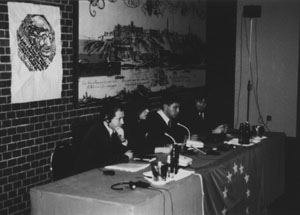
9 MARCH - Italy: Rome - Disarmament
A meeting and debate is held at the Radical headquarters on the theme: "Against the imminent crisis: a non-proliferation treaty for an international regime against the exportation of weapons".
References:
31 March. Albania. First democratic elections.
Georgia. Declaration of independence.
31 MARCH-2 APRIL - Tirana: Democracy in Albania
Marco Pannella participates, with an EP delegation, in the supervision of the first democratic elections in Albanian history.
5 APRIL - Italy: Rome - Human Rights
Press Conference held by Roberto Cicciomessere and Giovanni Negri on the extermination of the Kurdish population in Iraq.
15 APRIL - New York: U.S.A. - Antiprohibitionism
Emma Bonino and Marco Taradash are arrested a second time for the unauthorized distribution of sterile syringes, which is against the law in the State of New York.
23 APRIL - Hungary: Budapest - RP Headquarters
Assembly held to inaugurate the new headquarters.
28 APRIL - China: Beijing - Tibet
Giovanni Negri visits China with a delegation from the Italian Parliament, asking the Chinese Government to respect the rights of the Tibetan - and Chinese - people.
APRIL - Italy: Rimini - RP Seminar
Seminar on the ideal structure of a party in the "real democracy" of continental Europe; the transnational, transparty project of the Radical Party; the relationship between the Radical Party and Italian political movements; and the proposal for a democratic constituent assembly.
1 MAY - Kosovo: Pristina - Human Rights
Procession for peace in Kosovo organized by European and Serb Greens and by Yugoslavian Radicals.
3 MAY - Czechoslovakia: Prague - Death Penalty
Demonstration held on the anniversary of the abolition of the death penalty by the Czechoslovakian Federal Assembly.
5 MAY - Russia: Moscow - Human Rights
Protest staged in front of the Kremlin against the violence committed in Armenia and Azerbaijan.
11 MAY - Czechoslovakia: Prague - Assembly
First Congress held by Radicals residing and working in Czechoslovakia.
14 MAY - Italy: Rome - Disarmament
The Italian Chamber approves, on the initiative of the Radical Party, a motion - first signatory: Emma Bonino - asking for the creation of a system of non-proliferation of conventional weapons, especially those of mass destruction.
14 MAY - Russia: Moscow - Conscientious Objection
The collection of signatures on the petition for civilian, as opposed to military service, begins.
15 MAY - EP: Strasbourg - AIDS, Antiprohibitionism
The European Parliament approves the plan - Europe against AIDS - and incorporates a number of amendments proposed by Marco Taradash, including the distribution of sterile, disposable syringes to drug addicts.
23 MAY - Czechoslovakia: Prague - Human Rights - Tibet
Demonstration in favour of human rights in Tibet that have been violated by China’s Communist Regime.
16 MAY - Italy: Rome - Human Rights - China
Demonstration outside Palazzo Chigi in view of Italian Foreign Minister De Michelis’ visit to China.
24 MAY - Czechoslovakia: Prague - Antiprohibitionism
Antiprohibitionism information offensive.
3 JUNE - Russia: Moscow - Democracy
Demonstration outside the seat of the Mossoviet to defend the democratic political rights of Muscovite citizens asked to take part in direct mayoral elections.
A referendum is held on the "first past the post" electoral system - on which approximately 80% voted in favour. Out of three referendums, it was the only one accepted by the Constitutional Court. The other two, aimed at introducing the majority system in the Senate and in the Municipalities, were also presented by the Radicals.
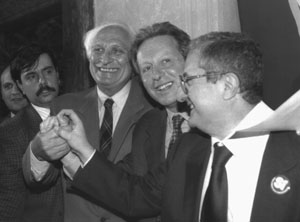
19 JUNE - Karlovy Vary - Czechoslovakia
Antiprohibitionism
Conference-Assembly: "Legalizing Drugs: the Antiprohibitionist Proposal".
References:
25 June. Slovenia and Croatia secede from Yugoslavia, after holding referendums.
Yugoslavian military bases in Slovenia react by sending in jet fighters, but the territorial armies soon succeed in taking the bases. Federal troops would only retreat to Serbia on 18 July.
26 JUNE - Italy: Rome - Former Yugoslavia
The RP asks the international community to immediately recognize the Republics of Croatia and Slovenia.
29 JUNE - Nova Gorica - Eastern Slovenia - Former Yugoslavia
Roberto Cicciomessere goes to Slovenia to witness for himself the situation created in the Republic by the intervention of the Federal Army.
29 JUNE - Ljubljana - Slovenia, Former Yugoslavia
Marco Pannella meets Milan Kucan, President of the Slovenian Republic.
References:
30 June. Croatia. Uprising of Serbs in Krajna
3 JULY - Italy: Rome - Justice
Sergio Stanzani and Sergio D’Elia meet Nicoḷ Amato, Head of the Department of Prison Administration, to discuss the problem of prisoners suffering from AIDS.
3 JULY - Israele - Radical Wood
KEREN - an international Jewish organization founded to gather funds for the reforestation of the Negev desert - dedicates a wood in Israel to Marco Pannella and the Radical Party.
JULY - Czechoslovakia: Prague - Antiprohibitionism
Marco Taradash meets with the Deputy Prime Minister of the Federal Republic to discuss antiprohibitionism.
18 JULY - Italy: Rome - Transnational Project
Press conference to present the RP project proposed by Sergio Stanzani in his report at the III Italian Congress. For the first few months of the year the Party was engaged in studying the technical, organizational and political feasibility of the project. In May the first issue of a twelve-page newspaper was published in Italian, translated into fourteen languages, and sent to over 40,000 members of democratic assemblies throughout the world, and about 250,000 other people.
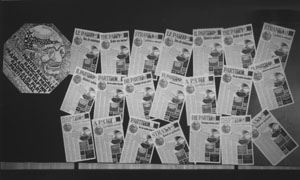
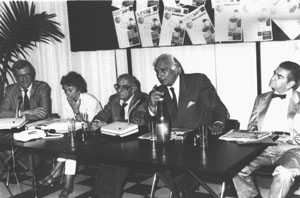
23 JULY - Italy: Rome - Institutional Crisis
Speaking at a press conference, Marco Pannella calls for the resignation of Italian President Francesco Cossiga.
References:
27 July. Croatia. Federal troops attack the Croatian army at Glina, to "put a stop to the clashes between Croatians and Serbs". Fighting spreads all along the border.
31 JULY - Norway - Bergen - Esperanto
Giorgio Pagano represents the RP at the World Esperantist Congress.
Pannella lays formal charges with the Commission for Prosecution Proceedings in the Chamber of Deputies, against the Italian President for undermining the Constitution. In February ’92 the charges were withdrawn, after they had been "shelved" for six months by the Commission, and more specifically by its president Macis, a deputy representing the Democratic Party of the Left.
References:
19 August. USSR. Attempted putsch by a group of hard-line communists. The strong, determined reaction of the people of Moscow and Leningrad resulted in the failure of the coup in just three days, while accusations made by Boris Yeltsin obliged Gorbachev to resign as leader of the CPSU.
19 AUGUST - Italy: Rome - Eastern Europe - Putsch in Russia
A few hours after the coup in the Soviet Union, Marco Pannella asks Italy and the EEC not to recognize the new government. An extraordinary meeting of the Italian Chamber is convened. Radicals demonstrate outside the Soviet Embassy.
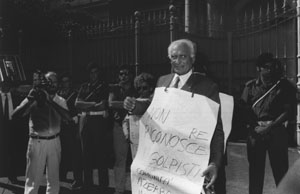
23 AUGUST - Italy: Rome - Death Penalty
As soon as the putsch in the Soviet Union is quelled, First Secretary of the RP Sergio Stanzani launches an appeal for the abolition of the death penalty in the Soviet Union.
Rome - III ITALIAN CONGRESS OF THE RADICAL PARTY
Excerpt from the Report by Secretary Sergio Stanzani:
"...The aim of the Radical Party's political project for 1991 is to constitute a self-financing, direct-membership, transnational, transparty force.
This objective implies the practice of a method designed to create a party capable of supranational, nonviolent action, where each activist can engage in nonviolent initiatives to obtain the approval, at the same time and on the same day, of the same legislative text presented by the parliamentarians of the various countries who have shown interest and become involved in the Party's political initiative.
The Party intends to use this method in dedicating itself to this objective, being of the opinion that politics should transform the knowledge of the tremendous problems that affect human destiny into collective awareness and into the ability to shoulder responsibility and to make decisions; in other words, into power.
This necessitates a political project that will make it possible for the Party to establish relations with the political and ruling classes of other countries, starting with those in Europe.
To achieve mobilization, to unite the parliamentarians and members of the international ruling class at which the project is aimed it will have to incorporate an informative phase and, ideally, a newspaper.
This, like the project, is an extremely complex and ambitious undertaking, the likes of which has never been embarked on to date.
Our initial objective is to reach, in both Eastern and Western Europe, the parliamentarians and elected representatives of legislative assemblies or assemblies with considerable political responsibility and influence, whether they be national, federal or regional, with autonomous powers. It is a question of reaching and communicating with approximately 35,000 elected representatives, in about 300 institutional seats in 35 countries, as well as in the European Parliament.
In the newspaper we would explore such themes as: the application of the death penalty and the use of torture; the quality of life; the ecological wellbeing of the planet; the dumping of waste products in Europe; the greenhouse effect; the preservation of the ozone layer; deforestation; the use of chemicals in agriculture; the relaunch, through the affirmation of positive law, of the initiative to strengthen and make binding international law and to redefine the role of the UN; the conversion of military spending into projects that would give life to those one billion people who are threatened by starvation and, consequently, the relaunch of the action that followed the "Manifesto of the Nobel Prizewinners"; the political union of the States of Europe, as the instrument for overcoming nationalism and racial and linguistic barriers; antiprohibitionism as a means of fighting crime boosted by the illegal sale of drugs; anti-totalitarianism and the affirmation of human rights; the abolition of gun licences; the abolition of prisons, or making them redundant; criminal law; the need for a "vehicular language" that would give speakers of the hegemonic language a second language; the demographic issue; the confrontation of demographic issues in ecological terms; abortion; sex education.
With this initiative we propose, on the one hand, to communicate the political project of the Transnational Radical Party and, on the other, to stimulate interest, discussion and debate so that transnational, transparty parliamentary groups and other elements of the political and ruling classes of the countries in question might collaborate with us on this project or one or more of its specific objectives.
It is a project, an undertaking whose economic and financial requirements are far greater than anything embarked on by the Party so far: the minimum cost of each publication is estimated at between $435,000-$522,000, for an overall cost, for 6-8 issues, of between $2,609,000-$4,348,000.
On the basis of the 1991 budget, the Party is able to invest $2,609,000 in the project; theoretically, it could also draw on its Italian assets.
We therefore need the contribution of others, of 50,000 members whose support would turn this idea into a reality and would help to create this instrument of nonviolent action, something that the Radical Party intends to practise continually, rather than simply demonstrate that it is possible...